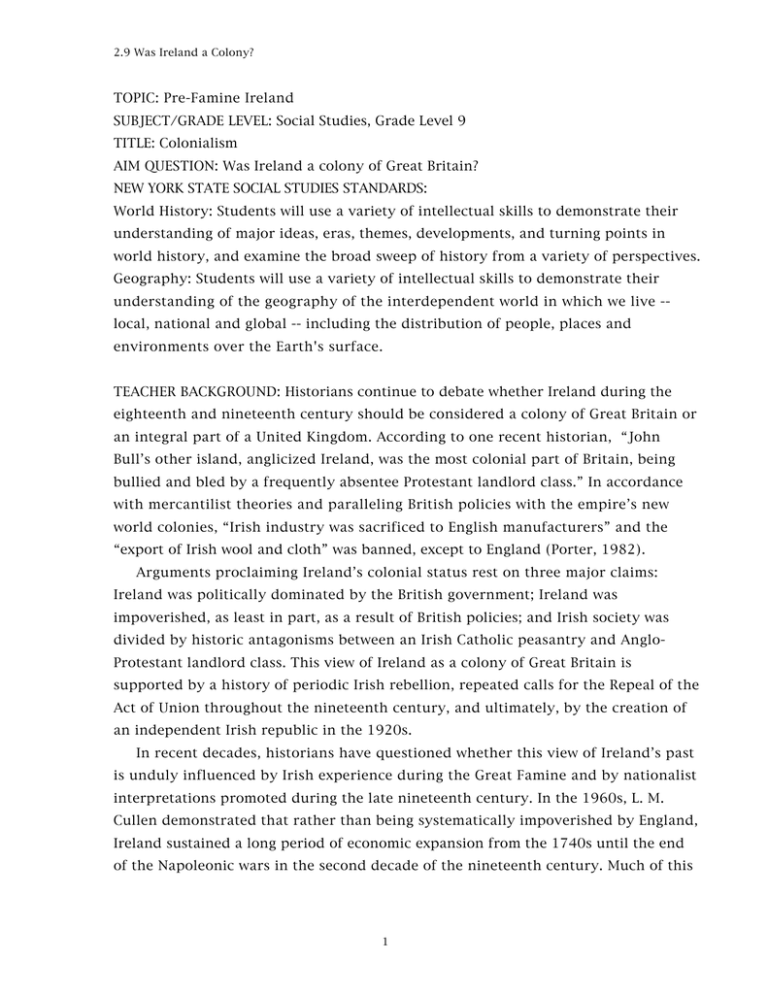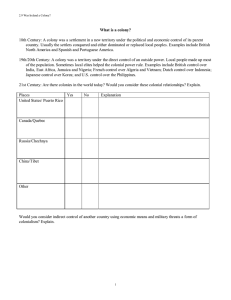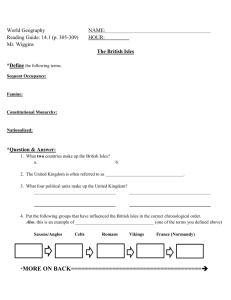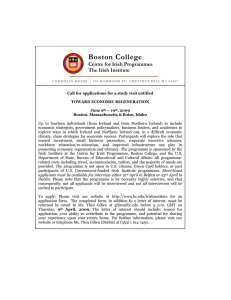TOPIC: Pre-Famine Ireland SUBJECT/GRADE LEVEL: Social Studies, Grade Level 9 TITLE: Colonialism
advertisement

2.9 Was Ireland a Colony? TOPIC: Pre-Famine Ireland SUBJECT/GRADE LEVEL: Social Studies, Grade Level 9 TITLE: Colonialism AIM QUESTION: Was Ireland a colony of Great Britain? NEW YORK STATE SOCIAL STUDIES STANDARDS: World History: Students will use a variety of intellectual skills to demonstrate their understanding of major ideas, eras, themes, developments, and turning points in world history, and examine the broad sweep of history from a variety of perspectives. Geography: Students will use a variety of intellectual skills to demonstrate their understanding of the geography of the interdependent world in which we live -local, national and global -- including the distribution of people, places and environments over the Earth's surface. TEACHER BACKGROUND: Historians continue to debate whether Ireland during the eighteenth and nineteenth century should be considered a colony of Great Britain or an integral part of a United Kingdom. According to one recent historian, “John Bull’s other island, anglicized Ireland, was the most colonial part of Britain, being bullied and bled by a frequently absentee Protestant landlord class.” In accordance with mercantilist theories and paralleling British policies with the empire’s new world colonies, “Irish industry was sacrificed to English manufacturers” and the “export of Irish wool and cloth” was banned, except to England (Porter, 1982). Arguments proclaiming Ireland’s colonial status rest on three major claims: Ireland was politically dominated by the British government; Ireland was impoverished, as least in part, as a result of British policies; and Irish society was divided by historic antagonisms between an Irish Catholic peasantry and AngloProtestant landlord class. This view of Ireland as a colony of Great Britain is supported by a history of periodic Irish rebellion, repeated calls for the Repeal of the Act of Union throughout the nineteenth century, and ultimately, by the creation of an independent Irish republic in the 1920s. In recent decades, historians have questioned whether this view of Ireland’s past is unduly influenced by Irish experience during the Great Famine and by nationalist interpretations promoted during the late nineteenth century. In the 1960s, L. M. Cullen demonstrated that rather than being systematically impoverished by England, Ireland sustained a long period of economic expansion from the 1740s until the end of the Napoleonic wars in the second decade of the nineteenth century. Much of this 1 2.9 Was Ireland a Colony? economic growth was the result of increased agricultural output and the production of linen to meet demand from British colonies in the Americas. Similarly, contemporary social historians argue that relationships between landlords and tenants in Ireland were more complex than previously noted. They describe parallels between British and Irish pre-industrial agrarian protest movements, suggesting that Irish farmers were challenging the forces of industrialization and enclosure rather than British rule. Catholic-Protestant relations also emerged as more complicated than described in earlier historical work. Many of the opposition movements in the late eighteenth and nineteenth centuries expressly bridged the religious divide. The success of the Irish Emancipation movement under the leadership of Daniel O’Connell, O’Connell’s participation in the British Parliament, and late nineteenth century advocacy of home rule, but not complete independence, also contribute to questions about whether Ireland was a colony of Great Britain or part of a United Kingdom. S. J. Connolly, writing in The Making of Modern Irish History (1996), suggests that the outstanding feature of the relationship between Ireland and Great Britain was actually Ireland’s ambiguous status, “too physically close and too similar to Great Britain to be treated as a colony, but too separate and too different to be a region of the metropolitan centre; inheriting an undoubted division between settler and native, yet without the racial distinctions that could make these absolute” (26). It may be that twentieth century Irish nationalism and the demand for independence were less products of British policy in Ireland than of the wave of nationalism that raged across Europe during the late nineteenth and early twentieth century, especially following the Great War. In Nations and Nationalism Since 1780 (1990), Eric Hobsbawn compares Irish nationalism with similar movements within the Austro-Hungarian Empire. According to Hobsbawn, British Prime Minister William Gladstone realized that nearly unanimous Irish Catholic electoral support for nationalist parties following the expansion of the right to vote in Great Britain in the 1880s doomed the union and made Irish independence virtually inevitable (85). Part of the difficulty in defining Ireland as a colony of Great Britain is that the term colony has multiple meanings. In the 18th century, colonies were settlements in new territories that maintained political and economic ties with a parent country. The thirteen British colonies in North America that later formed the United States clearly fit this definition. English efforts under Oliver Cromwell during the 17th century to replace Catholic tenant farmers with resettled Protestant farmers on Irish “plantations” can also be considered a colonial policy. However, unlike in North 2 2.9 Was Ireland a Colony? America, the indigenous population, in this case Irish Catholics, predominated. In the second half of the 19th century, European imperialism produced a second type of colony. In the imperial system, a colony was a territory under direct control of an outside power. It did not necessarily involve a shift in population. Applying this definition, Great Britain’s relationship with Ireland during the 18th and 19th century can be considered a precursor of later British rule on the Indian subcontinent and in Africa. Great Britain’s experience in Ireland may also parallel the 20th century French experience in Algeria, the Ethiopian experience in Eritrea, and the Russian experience in Eastern Europe and Central Asia. In these cases, lands and people that were considered integral parts of the nation by the dominant group, rebelled and secured national independence. The late eighteenth century was an era of tumultuous argument over the Natural Rights of Man and the right of people to self-government. It was an era when revolutions broke out in the British colonies in America, in France, in the French colony of Haiti and in Ireland. This lesson examines the history of Ireland within this context. Teachers scaffold on prior student knowledge of the American War for Independence to discuss what it means to be a colony and whether Ireland was a British colony or a partner in the United Kingdom. It is important to remember that up until the actual decision to declare independence, American leaders were demanding their rights as Englishmen. Demands for full integration into an empire do not necessarily preclude a rapid shift to demands for political independence. Teachers also compare Irish challenges to Great Britain with similar movements in Haiti and Latin America. 3 2.9 Was Ireland a Colony? AIM: Was Ireland a colony of Great Britain? ASSESSMENT: - Students will demonstrate an understanding of cause and effect in history and the ability to support conclusions based on an evaluation of evidence through individual and group writing assignments and during group and class discussions. - Students will demonstrate the importance of examining and respecting multiple perspectives when explaining historical events. - Students will demonstrate the ability to examine and explain the significance of primary source documents. DO NOW ACTIVITY: What is a colony? Locate places on the map. Similarities and differences. MOTIVATIONAL ACTIVITY: Explain controversy surrounding Ireland as colony. TRANSITIONAL ACTIVITY: Review activity sheet, what is a colony. ACTIVITY: Examine Age of Revolution. Examine Irish Revolution rhetoric. Compare Ireland with America. SUMMARY QUESTION: Historians remain divided. Was Ireland a colony? APPLICATION: Would you have supported Irish Independence? HOMEWORK: Write a speech as American on Ireland. Reflection: 4 2.9 Was Ireland a Colony? ACTIVITY SHEET A: What is a colony? 18th Century: A colony was a settlement in a new territory under the political and economic control of its parent country. Usually the settlers conquered and either dominated or replaced local peoples. Examples include British North America and Spanish and Portuguese America. 19th/20th Century: A colony was a territory under the direct control of an outside power. Local people made up most of the population. Sometimes local elites helped the colonial power rule. Examples include British control over India, East Africa, Jamaica and Nigeria; French control over Algeria and Vietnam; Dutch control over Indonesia; Japanese control over Korea; and U.S. control over the Philippines. 21st Century: Are there colonies in the world today? Would you consider these colonial relationships? Explain. Places United States/ Puerto Rico Yes No Explanation Canada/Quebec Russia/Chechnya China/Tibet Other Would you consider indirect control of another country using economic means and military threats a form of colonialism? Explain. 5 2.9 Was Ireland a Colony? (Edited Version) ACTIVITY SHEET B) Why did British colonies in North America declare Independence during the Age of Revolution (1765-1820)? Read each passage. 1- Identify the main idea of each passage. 2- Explain how the author provides support for American independence. Benjamin Franklin (Testimony before the British House of Commons on the American Stamp Act, 1766): “ (B)y the same charter, and otherwise, they (the American colonists) are entitled to all the privileges and liberties of Englishmen; they find in the Great Charters, and the Petition and Declaration of Rights, that one of the privileges of English subjects is, that they are not to be taxed but by their common consent; they have therefore relied upon it, from the first settlement of the province, that the Parliament never would, nor could, by color of that clause in the charter, assume a right of taxing them, till it had qualified itself to exercise such right, by admitting representatives from the people to be taxed. . . ‘The common rights of Englishmen,’ as declared by Magna Charta, and the Petition of Rights, all justify it.” Thomas Paine (Common Sense, 1776): “But Britain is the parent country, say some. Then the more ashame upon her conduct. Even brutes do not devour their young, nor savages make war on their families. . . This new world hath been the asylum for the persecuted lovers of civil and religious liberty from every part of Europe. Hither have they fled, not from the tender embraces of the mother, but from the cruelty of the monster; and it is so far true of England, that the same tyranny which drove the first emigrants from home, pursues their descendants still.” Thomas Jefferson et al (Declaration of Independence, 1776): “We hold these truths to be self-evident, that all men are created equal, that they are endowed by their Creator, with certain unalienable rights, that among these are life, liberty, and the pursuit of happiness. That to secure these rights, governments are instituted among men, deriving their just powers from the consent of the governed. That whenever any form of government becomes destructive of these ends, it is the right of the people to alter or to abolish it. . .The history of the present King of Great Britain is a history of repeated injuries and usurpations, all having in direct object the establishment of an absolute tyranny over these States.” (Edited Version) 6 2.9 Was Ireland a Colony? ACTIVITY SHEET C)Ireland in the Age of Revolution (1765-1820) Read the introduction and each passage. 1- Identify the main idea of each passage. 2- Explain whether the author provides support for Irish independence. 3- How are these statements similar to or different from American calls for independence? 4- Based on discussions in class and these passages, explain whether you would have supported Irish independence during the Age of Revolution if you were: (a) An Irish Catholic tenant farmer; (b) An Anglo-Irish Protestant professional or landlord; (c) A member of the Irish Catholic urban middle class; (d) An English businessman or meber of Parliament. The first three passages are by leaders of the struggle for greater rights for the Irish. Jonathan Swift was a noted author who wrote at the beginning of the 18th century. When he wrote, Ireland had its own Parliament. His demand is for the same rights as Englishmen. Wolfe Tone and Leonard McNally were leaders of the United Irishmen at the end of the 18th century. They demanded independence for Ireland. Lord Clare was a leading advocate of formal union between Ireland and England in the United Kingdom under one Parliament and King. Clare warns that the Irish elite should consider what would happen if Ireland became independent. Clare uses the term colony in the 18th century form referring to English settlers in Ireland. Jonathan Swift: “Were not the people of Ireland born as free as those of England? Is not their Parliament as fair and as representative of the people as that of England? Are they subjects of the same King? Does not the same sun shine on them? And have they not the same God for their protector? Am I a free man in England, and do I become a slave in six hours by crossing the Channel?” Wolfe Tone: “To subvert the tyranny of our execrable government, to break the connection with England, the never failing source of all our political evils and to assert the independence of my country -- these were my objects. To unite the whole people of Ireland, to abolish the memory of all past dissensions, and to substitute the common name of Irishman in place of the denominations of Protestant, Catholic and Dissenter - these were my means.” 7 2.9 Was Ireland a Colony? Leonard McNally: “The whole body of the peasantry would join the French in case of an invasion. . . The suffering of the common people from high rents and low wages, from oppressions of their landlords . . . and tithes are not the only causes of disaffection to Government and hatred of England; for though these have long kept the Irish peasant in a state of slavery and indigence, yet another cause, more dangerous, pervaded them all. . . This cause is an attachment to French principles in politics and religion, and an ardent desire for a republican government.” Lord Clare: “The whole power and property has been conferred by successive monarchs of England upon an English colony composed of three sorts of English adventurers who poured into this country at the termination of three successive rebellions. Confiscation is their common title and from their first settlement they have been hemmed in on every side by the old inhabitants of the island, brooding over their discontents in sullen indignation. What was the security of the English settlers for their physical existence? And what is the security of their descendants at this day? The powerful and commanding position of Great Britain. If by any fatality, it fails, you are at the mercy of the old inhabitants of this island, and I should have hoped that the examples of mercy exhibited by them in the late rebellion would have taught the gentlemen who call themselves the Irish nation to reflect with sober attention on the dangers which surround them.” 8 2.9 Was Ireland a Colony? (Adapted/Rewritten Version) ACTIVITY SHEET B) Why did British colonies in North America declare Independence during the Age of Revolution (1765-1820)? Read each passage. 1- Identify the main idea of each passage. 2- Explain how the author provides support for American independence. Benjamin Franklin (1766): American colonists are entitled to all the privileges and liberties of Englishmen. One of the privileges of English subjects is that they are not to be taxed but by their common consent. They have relied upon it from the first settlement of the province that the Parliament never would assume a right of taxing them until it had admitted representatives from the people to be taxed. The rights of Englishmen, as declared by Magna Charta, and the Petition of Rights, all justify it. Thomas Paine (Common Sense, 1776): Some say that Britain is the parent country. Then the more ashame upon her conduct. Even brutes do not devour their young, nor savages make war on their families. This new world has been the asylum for the persecuted lovers of civil and religious liberty from every part of Europe. Here they fled, not from the tender embraces of the mother, but from the cruelty of the monster. It is so far true of England, that the same tyranny which drove the first emigrants from home, pursues their descendants still. Thomas Jefferson et al (Declaration of Independence, 1776): We hold these truths to be self-evident, that all men are created equal, that they are endowed by their Creator, with certain unalienable rights, that among these are life, liberty, and the pursuit of happiness. That to secure these rights, governments are instituted among men, deriving their just powers from the consent of the governed. That whenever any form of government becomes destructive of these ends, it is the right of the people to alter or to abolish it. The history of the present King of Great Britain is a history of repeated injuries and ursurptions (seizing of power), all having in direct object the establishment of an absolute tyranny over these States. 9 2.9 Was Ireland a Colony? (Edited Version) ACTIVITY SHEET C)Ireland in the Age of Revolution (1765-1820) Read the introduction and each passage. 1- Identify the main idea of each passage. 2- Explain whether the author provides support for Irish independence. 3- How are these statements similar to or different from American calls for independence? 4- Based on discussions in class and these passages, explain whether you would have supported Irish independence during the Age of Revolution if you were: (a) An Irish Catholic tenant farmer; (b) An Anglo-Irish Protestant professional or landlord; (c) A member of the Irish Catholic urban middle class; (d) An English businessman or meber of Parliament. The first three passages are by leaders of the struggle for greater rights for the Irish. Jonathan Swift was a noted author who wrote at the beginning of the 18th century. When he wrote, Ireland had its own Parliament. His demand is for the same rights as Englishmen. Wolfe Tone and Leonard McNally were leaders of the United Irishmen at the end of the 18th century. They demanded independence for Ireland. Lord Clare was a leading advocate of formal union between Ireland and England in the United Kingdom under one Parliament and King. Clare warns that the Irish elite should consider what would happen if Ireland became independent. Clare uses the term colony in the 18th century form referring to English settlers in Ireland. Jonathan Swift: Were not the people of Ireland born as free as those of England? Is not their Parliament as fair and as representative of the people as that of England? Are they subjects of the same King? Does not the same sun shine on them? And have they not the same God for their protector? Am I a free man in England, and do I become a slave in six hours by crossing the Channel? Wolfe Tone: To stop the tyranny of our government, to break the connection with England, the never failing source of all our political evils and to assert the independence of my country -- these were my objects. To unite the whole people of Ireland, to abolish the memory of all past divisions, and to substitute the common name of Irishman in place of Protestant, Catholic and Dissenter - these were my means. 10 2.9 Was Ireland a Colony? Leonard McNally: The peasantry would join the French in case of an invasion. The suffering of the common people from high rents and low wages, from oppressions of their landlords and taxes are not the only causes of disaffection to Government and hatred of England; for though these have long kept the Irish peasant in a state of slavery and poverty, yet yhere is another cause, even more dangerous. This cause is belief in French principles in politics and religion, and a strong desire for a republican government. Lord Clare: “The whole power and property has been given by Kings of England to an English colony of adventurers who poured into this country at the end of three rebellions. Confiscation (of the land) is their common title. They have been hemmed in on every side by the old inhabitants of the island, brooding over their discontents in sullen anger. What was the security of the English settlers for their physical existence? And what is the security of their descendants at this day? The powerful and commanding position of Great Britain. If by any fatality, it fails, you are at the mercy of the old inhabitants of this island. I should have hoped that the examples of mercy exhibited by them in the late rebellion would teach the gentlemen who call themselves the Irish nation to reflect on the dangers which surround them. 11








